- Home
- Vicki Delany
A Winter Kill
A Winter Kill Read online
A
WINTER
KILL
VICKI DELANY
Copyright © 2012 Vicki Delany
All rights reserved. No part of this publication may be reproduced or transmitted in any form or by any means, electronic or mechanical, including photocopying, recording or by any information storage and retrieval system now known or to be invented, without permission in writing from the publisher.
Library and Archives Canada Cataloguing in Publication
Delany, Vicki, 1951-
A winter kill [electronic resource] / Vicki Delany.
(Rapid reads)
Electronic monograph.
Issued also in print format.
ISBN 978-1-55469-957-5 (PDF).--ISBN 978-1-55469-958-2 (EPUB)
I. Title. II. Series: Rapid reads (Online)
PS8557.E4239W56 2012 C813’.6 C2011-907569-5
First published in the United States, 2012
Library of Congress Control Number: 2011942470
Summary: When rookie police constable Nicole Patterson discovers a body on the edge of town, she’s drawn into a murder investigation that’s well beyond her experience and expertise. (RL 2.8)
Orca Book Publishers is dedicated to preserving the environment and has printed this book on paper certified by the Forest Stewardship Council®.
Orca Book Publishers gratefully acknowledges the support for its publishing programs provided by the following agencies: the Government of Canada through the Canada Book Fund and the Canada Council for the Arts, and the Province of British Columbia through the BC Arts Council and the Book Publishing Tax Credit.
Design by Teresa Bubela
Cover photography by Getty Images
ORCA BOOK PUBLISHERS ORCA BOOK PUBLISHERS
PO Box 5626, Stn. B PO Box 468
Victoria, BC Canada Custer, WA USA
V8R 6S4 98240-0468
www.orcabook.com
Printed and bound in Canada.
15 14 13 12 • 4 3 2 1
For my mother, a teacher
Contents
CHAPTER ONE
CHAPTER TWO
CHAPTER THREE
CHAPTER FOUR
CHAPTER FIVE
CHAPTER SIX
CHAPTER SEVEN
CHAPTER EIGHT
CHAPTER NINE
CHAPTER TEN
CHAPTER ELEVEN
CHAPTER TWELVE
CHAPTER THIRTEEN
CHAPTER ONE
Sometimes you can just tell. When they’re dead.
They don’t have to even look dead. Not really. More like they’re sleeping.
There’s something different about a dead body.
You can always tell.
I haven’t seen many dead bodies. Not yet. I’ve only been a cop for six months.
I took a deep breath and swung the beam of my flashlight around the field. I touched the radio at my shoulder with one hand and the Sig Sauer at my hip with the other. Trying to steady my nerves. The sky above was pitch black, and it was very cold.
A plastic bag that had blown up against the rusty wire fence moved. My heart jumped into my throat. It was only a cat. Yellow eyes glared at me. It hissed once and darted off. Its tail swayed in the still air and then it was gone.
All was quiet. A single car drove down the road. It did not stop. When I thought I could breathe properly again, I spoke into the radio. “Dispatch. Three-oh. One-oh-two.”
“Go ahead, one-oh-two.”
“I’m on Kingsley Road, not far from County Road Twenty-two. Near the airfield. VSA. I need an ambulance and backup.”
VSA, the dispatcher knew, means vital signs absent. A dead body in other words.
This road was well out of town. The moon and the distant lights of Picton were hidden by thick clouds. The long rows of boarded-up buildings on the abandoned World War II airfield were dark. Amber and white security lights did little to break the night. The flashing red and blue of my patrol car reflected off the snow.
I shifted my feet. Snow crunched beneath my boots. I dropped to a squat beside the body. It was a woman. Her long pink scarf was wrapped tightly around her neck. Too tight to let air pass. I ran the beam of my flashlight across her face. Her eyes bulged. Her mouth hung open and a swollen pink tongue stuck out. A silver ball was pierced through the middle. She had piercings running up her right ear and in one eyebrow. I pulled off my gloves and held my fingers to the side of her neck. Cold and still.
She was dressed in jeans and scruffy running shoes and a bright blue jacket. Threads escaped from an old tear in the jacket sleeve. Her hands were bare even though the temperature was well below freezing. She must have been very cold. Before she died.
Her hands were the color of skim milk, white touched with blue. Her jeans were unzipped and pulled down past her hips. I could see the lacy trim of a pink thong. But the jeans were still on, the girl’s legs together. Had this been an attempted rape? If so, it had not gone very far.
Had something, or someone, scared him away?
It wasn’t me. This girl had been dead for more than a few minutes.
I looked into her face and saw something familiar. Her skin was clean of makeup and her blond hair shone in the beam of my flashlight.
She was local. I’d seen her around. I was pretty sure she went to Prince Edward District High School.
At the welcome sound of sirens I let out a breath I hadn’t known I was holding in. Coming my way. Police car first, then an ambulance. I wanted to lower the girl’s lids over her bulging eyes, but knew not to disturb the scene. I pushed myself to my feet and lifted my flashlight. I shone the beam of light across the field to the road, letting them know where I was.
The snow was very deep. It was all churned up around here, but I couldn’t see any boot tracks. The body was a couple of yards from the road. It looked as if a vehicle had pulled in. She’d been dragged out of a car and dumped. Then whoever had done it had brushed away his tracks and driven off.
The light shone on something half buried in the snow. A piece of blue glass. I reached out my hand to pick it up, before remembering where I was.
And who I was.
A probationary cop with the Ontario Provincial Police in Prince Edward County, Ontario.
My name is Nicole Patterson. I’m twenty-four years old. I’ve been with the OPP for six months. This was a peaceful, mostly rural community. Lots of farms. Wineries and art galleries. Bed-and-breakfasts and tourist rentals close to the long sandy beaches of Sandbanks Provincial Park. Nice big homes for retired baby boomers from Toronto. Pretty scenery, proud people. Not much in the way of crime.
Before that night I’d seen two dead bodies. An old man who died alone a week before his neighbor began to wonder what the smell was. And a sixteen-year-old boy with a brand-new driver’s license who thought he was too cool to wear his seat belt. He skidded on a patch of black ice and went into a hydro pole straight on.
That was not cool.
The siren came closer and the field flooded with light.
“What you got, Patterson?” a man’s deep voice asked.
Sergeant Paul Malan, the detachment’s lead detective, was walking toward me. He was tall and thin, a runner’s body. His hair was cut short and his silver mustache was neatly trimmed. Behind him came the smaller frame of Constable Larry Johnstone.
I swung my flashlight to the ground. The young woman stared up at us through empty eyes. She was partially hidden behind a clump of bushes. I wouldn’t have seen her except that her legs were sticking out. The headlights of my cruiser had caught the white running shoes.
The paramedics stood back, watching. They had their stretcher out, piled with equipment bags. Malan made no move to invite them to move in.
There was no hu
rry.
“Look at that,” I said, pointing to the blue glass.
Malan crouched down and studied the object. Johnstone looked over his shoulder. The sergeant pulled a pen out of his pocket and slowly scooped the blue stone out of the snow. It was a ring. A large blue piece of glass set in a silver band. It didn’t look as if it cost very much.
Malan pulled a plastic bag out of his pocket and dropped the ring in.
“Know her?” he asked me.
“She goes to Prince Edward District High.”
“Name?”
I shrugged. “Don’t know it.”
“Okay. Let’s seal this area off. Johnstone, park your vehicle up the road a couple hundred yards. Patterson, watch the intersection. No one in or out other than police. Log everyone who comes by.”
“Got it,” Larry Johnstone grunted. He was also a new officer. He’d been on the force for about two years. I took one last look at the young woman on the ground. Her blond hair was long and straight. It shone in the headlights from the ambulance. She had been pretty, I remembered.
She was pretty no more.
CHAPTER TWO
“Patterson, you’re with me.” “Yes, sir. Uh, where are we going?”
Sergeant Malan had walked through the snow to the road where I’d spent the past few hours keeping the curious away. “The girl has id in her pocket. School card. I’m going to her house and need a ride. You can drive me.”
“Yes, sir,” I said. The forensic officers had arrived before the sun began to rise. Guys in white suits sifting through the snow and debris of the field. Looking for clues. For evidence. The paramedics had been allowed to take the body away. Yellow crime-scene tape protected the area. A few people had gathered to watch. They stood beside their cars on the opposite side of County Road 22. They were dressed in winter coats, scarves and heavy gloves. We got into my cruiser. Malan fastened his seat belt.
“This won’t be easy,” he said. “Never is.”
“Yes, sir.”
She’d lived in a run-down part of town, at the bottom of the hill where the abandoned airfield was. The houses were old. Some of them were neat and tidy, but many were badly looked after. Thin, scruffy trees lined the street. Snow was piled in dirty banks. All the lights were off. It was very quiet.
The driveway hadn’t been shoveled. I parked in the street. “I’ve been here before,” I said.
“We’ve all been to this house before,” Malan said. “Noise complaints, drunk and disorderly, fights. One time Grey couldn’t be bothered to go inside to take a leak. He pissed on his neighbor’s front lawn. Won’t make it any easier to tell him his daughter’s dead though.” We got out of the car. As we walked up the cracked and broken cement steps, a dog started to bark.
A piece of masking tape was stuck over the doorbell. Malan knocked. I shifted in my boots. It was very cold. Our breath formed little puffs in the air.
Malan knocked again. And again. Louder each time. Then a light came on at the back of the house. The barking dog got closer.
The front door opened a crack. “What the fuck do you want?” a man said. His hair was thin and unwashed. His eyes were small and very red. He blinked away sleep. He smelled of unbrushed teeth and stale beer.
“Mr. Grey,” Malan said. “May we come in?”
“Not without a warrant, you can’t.”
“You’re not in any trouble. Do you have a daughter by the name of Maureen?”
“What the fuck’s she done now?”
“Mr. Grey, is Maureen at home?”
“What business is that of yours?”
“What is it?” asked another voice from inside the house. It was a woman’s voice, low and frightened.
“Mrs. Grey, I’m sorry to disturb you, but I’m afraid I have some very bad news. It would be better if we discussed this inside.”
For the first time, Grey looked at me. I tried to keep my face still. He looked me up and down, and I felt very uncomfortable.
“Let the officers in,” the woman said. “If they have news about Maureen.”
Grey hesitated, and then he shrugged and opened the door.
The dog lunged for us. Grey laughed as I jumped backward with a frightened cry.
It was a big dog. Traces of German shepherd. Half its right ear was missing and its teeth were yellow. But the animal didn’t get near me. Mrs. Grey was holding tightly to its leash.
“Put the dog in another room, please,” Malan said.
The woman looked at her husband. He shrugged, and she dragged the snarling animal away.
Sergeant Malan and I stepped into the house. The living-room furniture was shabby, but no dust was on it. Aside from many ornaments, the room was uncluttered, but it smelled of cigarette smoke and cooking grease. Mrs. Grey came back. She twisted her hands in her faded blue nightgown.
“You have a daughter named Maureen?” Malan asked. His voice was soft and kind.
The Greys nodded.
“Is Maureen at home?”
“Nah,” Grey said. “She moved out a while ago.”
His wife’s eyes were wide with fear. “Is she in some sort of trouble? Maureen left home a few weeks ago. A temporary move. She’s been having problems at school. She needed a break. She’s staying with a friend.”
“Do you have the friend’s address?”
“No.”
“The name of this friend?”
She shook her head.
Maureen Grey had left home and her parents didn’t know where she’d gone. I’d call that running away, not taking a break. But I wasn’t here to express my opinion.
Malan reached into his pocket. Slowly he pulled out the student card from PE District High. I caught a glimpse of the picture. A blond girl, smiling broadly.
“Is this your daughter?” he asked Mrs. Grey. She reached out and took the card. Her hand was shaking.
“Yes.” Her voice was so soft it was hard to hear. “It’s Maureen. It’s my daughter.”
“I’m sorry to have to tell you this,” Malan said. “We found a body, a young girl, in the snow outside of town. She had this on her.”
Mrs. Grey let out a moan. She shook her head. “No, that can’t be right. Some other girl must have been carrying her school card. You’ve made a mistake.”
Her husband made no move to comfort her. “Where is she?” he asked Malan.
“She’s been taken to the hospital. If you’ll get dressed, we’ll take you to see her. We’ll need you to make a positive identification.”
CHAPTER THREE
A couple of days later I ran into Sergeant Malan in the lunchroom at the station. I was back on day shift, and as usual things were pretty quiet in the County in winter. He came in as I was filling the kettle to make a cup of tea to take on the road. He dug into the fridge for a plastic container. He sat at the big table in the center of the room and took out his sandwich. It looked good. Thickly sliced roast beef and Swiss cheese on whole-wheat bread. Bright yellow mustard leaked from the sides.
“Nicole,” he said. “You’re the one who found her, right? You’ll be interested in this. I’m just back from the Maureen Grey autopsy.”
“What’d they find?” I asked. I was interested. Right now I’m just a probationary constable, still pretty wet behind the ears and nervous whenever I get a call. But one day I might like to be a detective. “I figured it looked pretty obvious. She was strangled by that scarf.”
“That was the cause of death, yes. She’d been dead for two or three hours when you found her. There were no defensive wounds. No marks on her arms or hands to show she tried to fight off her attacker. Her fingernails were torn where she tried to get a grip on the scarf. Plenty of fibers from the scarf under her nails. A big bruise on her rear end where the attacker pressed his knee against her to hold her steady while he—or she—choked her.”
“What does that mean?”
“She was taken by surprise. Either her attacker snuck up on her or she didn’t expect him to attack her. It wou
ld have been over very fast.”
“I can’t see that anyone could have surprised someone out there. In a field in the middle of the night?”
“I agree. Highly unlikely she would have gone there alone. And not without gloves. There were none in her pockets, and we couldn’t find any nearby. Almost certainly she arrived in a car. And the driver of the car either killed her there or dumped the body. And drove off.”
“Can you tell anything from the bruise? About the size or height of the attacker?”
He smiled at me. “Good question, Constable.” I was childishly pleased at the praise. The other night was the first time I’d even spoken to the detective sergeant. He didn’t have much to do with a mere probationary constable.
“Yes, the assailant was around the same height as the girl, perhaps a bit more. She was very tall at five foot ten, so that includes a lot of men. Also any woman who might be shorter but was wearing boots with high heels.”
“So the autopsy didn’t tell you much?”
“Actually, Nicole, it told me a lot. Maureen Grey was four months pregnant.”
“Wow. I wonder if that’s important.”
“If you want hot water, you’d better get it,” he said. “The kettle stopped boiling a long time ago.”
I felt blood rush into my face. I blush very easily, and that’s a bad thing for a police officer. I busied myself with a tea bag, milk and sugar.
“It might explain why she wasn’t living at her parents’ house,” Malan said. “Her father has a bad temper and is quick with his fists. He might not have taken the news that he was about to become a grandfather very well.”
“Maybe he killed her when he found out?”
“It’s possible. Anything’s possible. I can’t really see Grey sneaking up behind his daughter and strangling her. He’s more a fist to the mouth sort of guy. Plus, he doesn’t own a vehicle. His truck was repossessed about a month ago. But he has plenty of friends who’d lend him their car, no questions asked. There’s no telling what a man like that is capable of. I can’t help but think the pregnancy might have had something to do with her death.”

 Silent Night, Deadly Night
Silent Night, Deadly Night Coral Reef Views
Coral Reef Views Deadly Summer Nights
Deadly Summer Nights Murder in a Teacup
Murder in a Teacup Whiteout
Whiteout Dying in a Winter Wonderland
Dying in a Winter Wonderland Tea & Treachery
Tea & Treachery Rest Ye Murdered Gentlemen
Rest Ye Murdered Gentlemen Body on Baker Street: A Sherlock Holmes Bookshop Mystery
Body on Baker Street: A Sherlock Holmes Bookshop Mystery Body on Baker Street
Body on Baker Street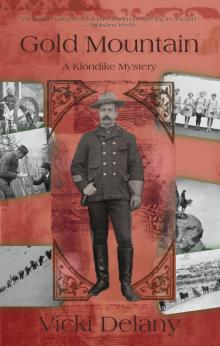 Gold Mountain
Gold Mountain Blue Water Hues
Blue Water Hues Hark the Herald Angels Slay
Hark the Herald Angels Slay Murder at Lost Dog Lake
Murder at Lost Dog Lake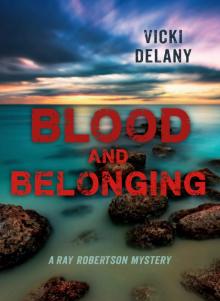 Blood and Belonging
Blood and Belonging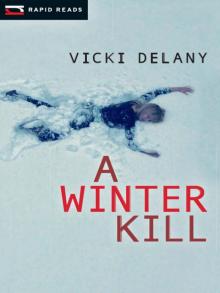 A Winter Kill
A Winter Kill White Sand Blues
White Sand Blues Scare the Light Away
Scare the Light Away Burden of Memory
Burden of Memory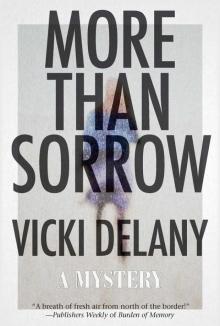 More Than Sorrow
More Than Sorrow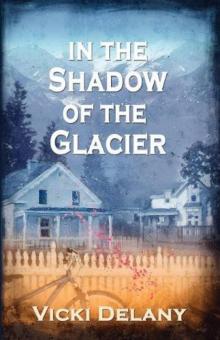 In the Shadow of the Glacier
In the Shadow of the Glacier Gold Digger: A Klondike Mystery
Gold Digger: A Klondike Mystery Gold Web
Gold Web Haitian Graves
Haitian Graves Valley of the Lost
Valley of the Lost We Wish You a Murderous Christmas
We Wish You a Murderous Christmas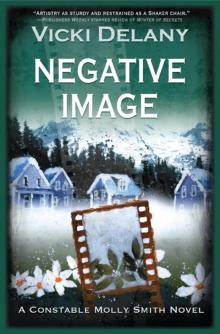 Negative Image
Negative Image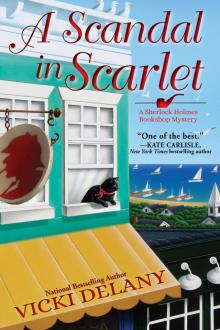 A Scandal in Scarlet
A Scandal in Scarlet Juba Good
Juba Good Winter of Secrets
Winter of Secrets Unreasonable Doubt
Unreasonable Doubt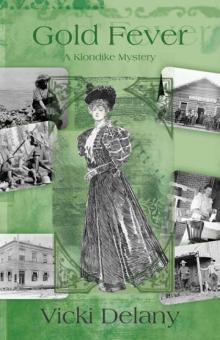 Gold Fever
Gold Fever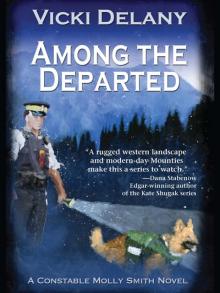 Among the Departed
Among the Departed Elementary, She Read: A Sherlock Holmes Bookshop Mystery
Elementary, She Read: A Sherlock Holmes Bookshop Mystery The Cat of the Baskervilles
The Cat of the Baskervilles